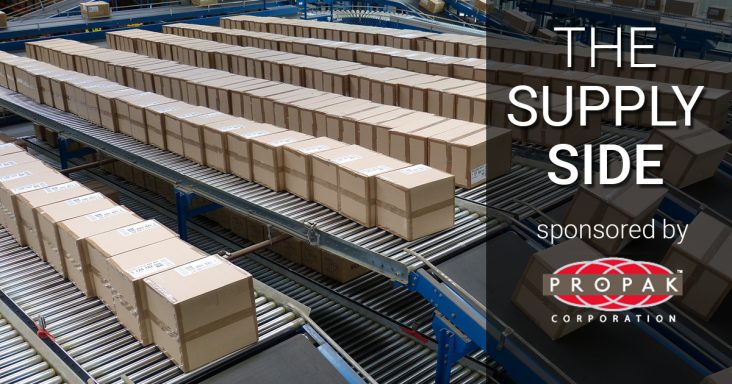The Supply Side: Walmart’s fulfillment service seen as positive for marketplace sellers
by March 19, 2022 7:21 am 1,582 views

Walmart has for two years offered inventory management (fulfillment) services for online sellers to streamline operations. Walmart Fulfillment Services (WFS), the company’s third-party fulfillment arm, is billed as a low-cost solution for online sellers and those who gain access through Walmart’s growing marketplace.
WFS allows sellers to store inventory at Walmart fulfillment centers. When a customer places an order on Walmart.com, WFS picks, packs and ships the item to the customer for the seller. WFS also handles all customer support and returns for these orders. The program enables sellers to focus on sales while confident that their orders will be delivered, Walmart said.
Amazon is the largest at handling fulfillment for marketplace sellers. Still, Walmart threw its hat into the ring two years ago and has seen tremendous growth, according to Jaré Buckley-Cox, WFS vice president.
“Last year, U.S. GMV [online sales] fulfilled by WFS grew 500%, and we are expecting robust growth to continue. What the team built from scratch has grown into a robust business with sellers located around the world. We’re so proud of how we’ve been able to collaborate with our sellers to build trust and transparency,” she noted.
In celebration of the second anniversary, the retail giant is offering incentives to new WFS sellers who sign up and inbound at least one item between Feb. 21 and April 30. Walmart said sellers receive free storage and 10% off fulfillment for the first 90 days. Walmart also said many sellers who use WFS to fulfill their items see a 50% sales increase on average.
Like Amazon, Walmart is taking control of the delivery for their online sellers. Walmart said sellers who use WFS benefit from better logistics, given Walmart’s scale. Items arrive in a Walmart box and are labeled “fulfilled by Walmart,” which builds credibility with customers. Walmart is also touting its 4,700 U.S. stores where customers can return an item if it fails to meet customer expectations. Amazon also offers customers the opportunity to return items to a local pickup center where they are packaged and returned at no cost to the consumer.
There are some requirements for sellers to sign-up for WFS, including no perishable or regulated products, a maximum weight of 150 pounds, full product length of 108 inches and maximum product girth of 165 inches. Walmart also requires the product to be shipped to its fulfillment centers in the contiguous U.S. Sellers who use WFS can take advantage of two-day delivery options that could be cost-prohibitive otherwise, given higher shipping costs for the final mile.
While there is no minimum number of items required, Walmart recommends that sellers list multiple items with continual inventory replenishment to see the total value and sales growth potential. Walmart also suggests sellers start with their best-selling items, premium brands or brands not already sold on Walmart.com.
“WFS, as a program, was easy to integrate and use, allowing us to scale up quickly and efficiently during the peak holiday shopping season,” said Brian Snapp, director of marketplace at Best Choice Products.
Control is the main reason Walmart is trying to grow the service, according to Annibal Sodero, a supply chain professor at Ohio State University. He said it also offers standardization of a complicated fulfillment process for single items shipped to single households. Sodero said smaller marketplace sellers likely wear many hats, and figuring out the cost structure for packing and shipping individual items can be cumbersome. He said Walmart works on behalf of the sellers for a cost.
“It could be seen as a cost of doing business,” he added.
He said a downside could be beefing up data transmission capabilities specific to Walmart, which would be another cost. He said WFS wants to streamline the fulfillment process and give sellers and end-users reliability of delivery, but it comes with costs, which is something each seller must weigh for themselves.
Carol Spieckerman, CEO of Spieckerman Retail, said it’s an excellent time for Walmart to grow and push its fulfillment services.
“Suppliers are eager to capitalize on the ongoing e-commerce boom, and Walmart is uniquely poised to navigate through supply chain snags,” she said. “Suppliers who often work with Walmart and Amazon see Walmart as the more amenable partner. Walmart is not taking that goodwill for granted as it continues to incentivize sellers to stick with the Walmart platform.”
She said Walmart’s diversification into solutions and services continues to bolster its long-term prospects, offsetting any headwinds that may impact product sales.
Jon Allen, CEO and founder of Rogers-based Woodbridge Retail Group, said WFS is a way for sellers to leverage Walmart’s speed and scale.
“Walmart is well-known for having one of the most impressive supply chain solutions globally. So we strongly recommend that our marketplace sellers take advantage of the speed, scale, and cost-effectiveness that Walmart Fulfillment Services delivers. It’s also creating a better customer experience, with the two-day delivery no longer being a perk but a customer expectation. WFS shoppers can take advantage of free two-day shipping. There’s no better way to improve conversions than creating a better customer experience,” Allen said.
He also said sellers using the services are automatically assigned Walmart’s two-day shipping tags and prioritized in Walmart’s search rankings, making it easy for sellers to increase their product’s visibility without cutting into profit margins. He also said that with shopper abandonments at roughly 30% because of shipping delays or added costs discovered at checkout, WFS sellers represented by Woodbridge have seen a 28% to 30% conversion rate increase after offering free two-day shipping.
Editor’s note: The Supply Side section of Talk Business & Politics focuses on the companies, organizations, issues and individuals engaged in providing products and services to retailers. The Supply Side is managed by Talk Business & Politics and sponsored by Propak Logistics.
